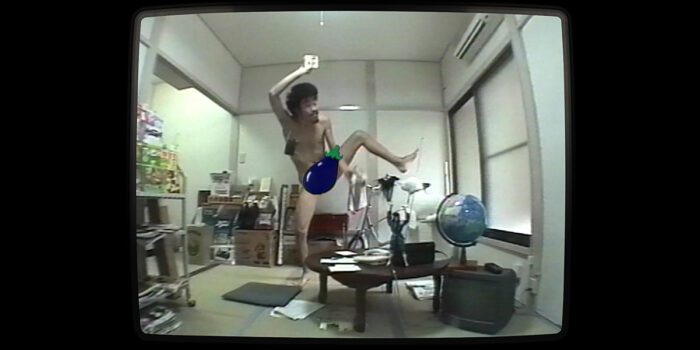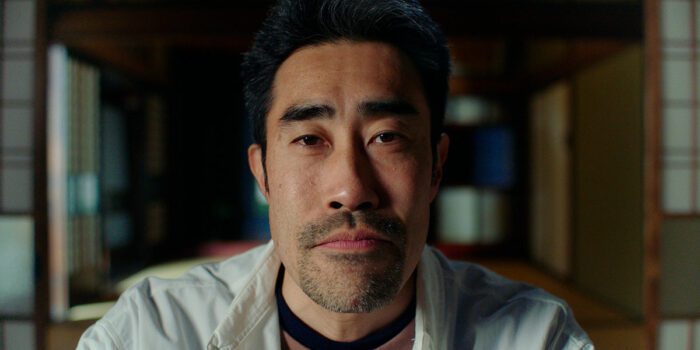“If you put what we’re about to show you in a movie, you wouldn’t believe it,” boldly claims an American newscaster in archival footage from a broadcast in the late 1990s. It’s a claim that many movies and documentaries like to make. They promise they’re going to show something you’ve never seen before and when the movie ends, the audience is like, is that it? Unless you were already familiar with the story of The Contestant, an official selection of the 2023 Toronto International Film Festival, the documentary will take more twists and turns than seems imaginable.
The Contestant tells the story of Nasubi, an aspiring Japanese actor in the ’90s. He left his small rural town of Fukushima to live in Tokyo. From a young age, he loved to make people laugh, but he found that many people were laughing at him instead of with him. Nasubi was bullied relentlessly in his adolescent years for having a long face and the name Nasubi (a nickname meaning eggplant) because of his long face. Nasubi wasn’t booking any big acting roles, so he decided to audition for Denpa Shōnen, a prank show similar to Impractical Jokers and Jackass in the United States. Denpa Shōnen, however, takes things to another level. Nasubi appears at an open audition for the show where, in a room of other hopefuls, everyone drew something out of a hat. Whoever had the special token won.
Won what? you might be asking. Nasubi, the winner, is immediately whisked away to an empty apartment. He has a seat cushion, a hot plate, a radio, a phone, a stack of postcards, pens, and hundreds of magazines. Nasubi is then asked to strip. Fully naked in the empty apartment, Nasubi is told what he won: the chance to see if it’s possible for a human to live solely off their winnings from magazine and radio sweepstakes until the winnings total $1 million Yen. Nasubi is told that most of the footage won’t ever be aired and he believes them because he never signed a contract. The truth of the matter is that Denpa Shōnen pioneered the idea of live-streaming and broadcasted Nasubi’s video 24/7 online.

The man behind this idea is Toshio Tsuchiya, the main producer for Denpa Shōnen and an individual obsessed with pushing humans to their absolute limits. Hence the idea of locking a person alone in a room and filming them 24/7. This is one of the founding reality shows and it sounds a lot like The Truman Show, even though that film wouldn’t be released until Nasubi was months into his solitude. As you can imagine, Nasubi became a sensation. As a prospective actor and comedian, he exudes charm and silliness. When presented as short clips for the TV show, it looks like he’s having a great time, but when Nasubi reflects on the experience, he talks about the loneliness and the all-time low his mental health reached. This is not difficult to imagine if you went through any of the COVID lockdowns solo, and even in that scenario there was the option to FaceTime or call a friend. Nasubi had nothing except for the things he won through the sweepstakes.
In this true crime era, The Contestant feels very urgent. Are we really considering what the psychological impact of turning traumatized individuals into celebrities can be? It’s miraculous that Nasubi can reflect upon his experience thoughtfully, or even that he’s alive to talk about it. There’s a particularly harrowing moment when this experiment in sweepstakes winnings is finally over and Nasubi is shown what its impact on Japanese culture has been. The look of this man, who spent over a year in complete solitude, is something audiences aren’t likely to forget.

Once The Contestant explains the timeline of Nasubi’s experience on the show, the documentary pivots to his philanthropic efforts. Nasubi’s hometown is Fukushima, where the devastating tsunami occurred in 2011, and he has decided to use his strange fame for good. He raised money for rebuilding the town he loved. While it’s lovely to see that Nasubi has remained a kind man, there’s a desire to have the mastermind of this film face tougher scrutiny. Tsuchiya almost gleefully calls himself the devil, and if he has any remorse, he doesn’t show it.
The documentary could have gotten answers and broadened its scope if Tsuchiya had been pressed more. While The Circle, Big Brother, and Love is Blind are obviously less extreme examples, they’re still confining people to rooms and filming them for the sake of entertainment. Obviously, the circumstances are very different, but what does our obsession with these types of shows say about us? The Contestant could’ve supplemented its footage with people who obsessively watched Nasubi’s live stream and asked why they couldn’t look away. Or talked to the people at Denpa Shōnen who didn’t say that maybe this wasn’t right. It’s inevitable that the story of The Contestant will be milked for further content and hopefully, now that Nasubi has had the space to reclaim his narrative, we can dig into the why and how of it all.




